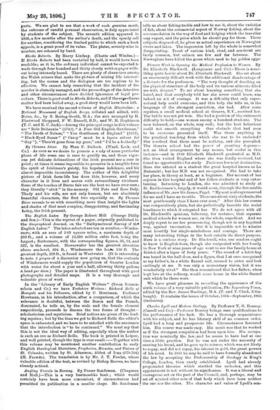Rhoda Roberts. By Harry Lindsay. (Chatto and Windus.)— If Rhoda
Roberts had been curtailed by half, it would have been readable; as it is, the ordinary individual cannot be expected to wade through four hundred and thirty closely written pages with- out being intensely bored. There are plenty of characters among the Welsh miners that make the picture of mining life interest- ing, but the scenes and the dialogues are too copious to be effective. We cannot help remarking that the incident of the murder is clumsily managed, and the proceedings of the detective and other circumstances show decided ignorance of legal pro- cedure. There is good stuff in Rhoda Roberts, and if the superfluous matter had been boiled away, a good story would have been left.
We have received the second volume of English Minstrelsie : a National Monument of Enghsh Songs, collated and edited, with Notes, Jsc., by S. Baring-Gould, ; the airs arranged by H. Fleetwood Sheppard, F W. Busse% B.D., and W. H. Hopkinson (T. C. and E. C. Jack).—Among the principal songs in this volume are "Rule Britannia" (1740), "A Fine Old English Gentleman," "The Death of Nelson," "You Gentlemen of England" (1613), "Black-Eyed Susan" (" Carey" must be a /apsus ealatni for "‘ Gay "), " Thou'rt gone from my gaze," and "I'd be a butterfly."


































 Previous page
Previous page